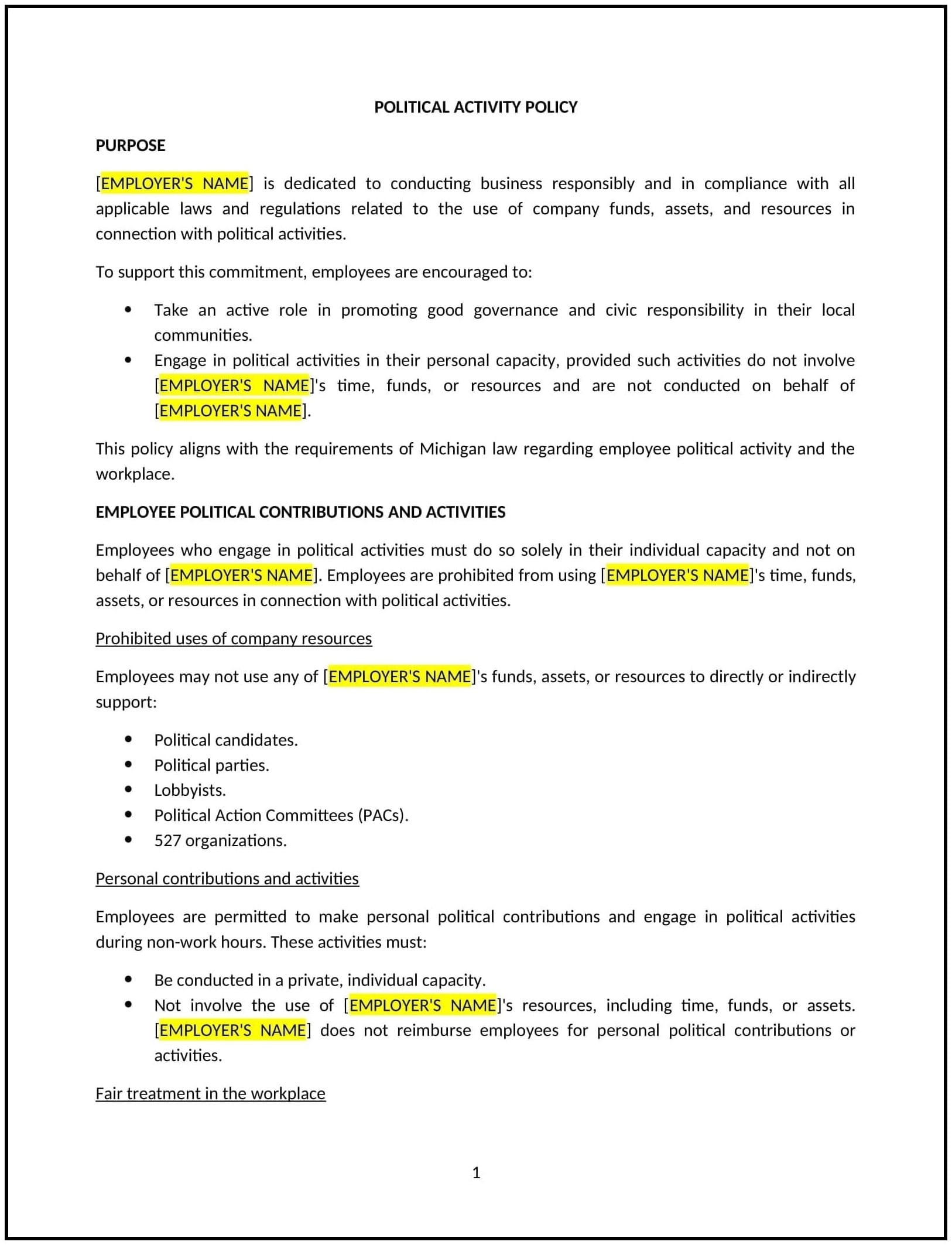Political activity policy (Michigan): Free template
Got contracts to review? While you're here for policies, let Cobrief make contract review effortless—start your free review now.

Customize this template for free
Political activity policy (Michigan)
A political activity policy outlines the guidelines for Michigan businesses regarding employees' participation in political activities, both inside and outside of the workplace. The policy defines the boundaries between personal political engagement and the business’s expectations for professionalism, neutrality, and compliance with relevant laws. It covers how employees can engage in political activities while ensuring that these activities do not conflict with their work responsibilities, impact workplace productivity, or create a divisive environment.
By implementing this policy, businesses can promote a respectful and professional work environment, mitigate the risk of legal issues, and maintain clear boundaries between employees' personal political views and their roles within the business.
How to use this political activity policy (Michigan)
- Define acceptable political activities: Specify what types of political activities are acceptable in the workplace, such as political discussions or activities during designated break times. Clarify what activities are not permitted, such as displaying political materials in the workplace or engaging in political campaigning during work hours.
- Establish boundaries for workplace conduct: Set clear expectations for behavior regarding political activities during work hours. Employees should be advised that work hours are for professional responsibilities, and political discussions or activities should not interfere with productivity.
- Clarify political activity outside of work: Outline the expectations for employees' political engagement outside of work, including whether they can represent the business in political campaigns or endorse political candidates while using the business’s name.
- Ensure neutrality in the workplace: Emphasize that the business should remain neutral in political matters and not favor one political party, candidate, or cause over another. Employees should be encouraged to maintain professionalism, especially in public-facing roles.
- Address the use of company resources: Prohibit the use of company resources (e.g., time, office equipment, or email systems) for political activities. Employees should be informed that company time and resources are for business-related activities only.
- Respect freedom of speech: Acknowledge that employees have the right to express their personal political views, but these expressions should be kept separate from their work duties and conducted in a manner that does not disrupt the workplace or violate business guidelines.
- Prevent discrimination or harassment: Outline how the business will prevent political discrimination or harassment, ensuring that all employees feel comfortable regardless of their political views. Employees should report any instances of political discrimination or harassment.
- Review and update regularly: Periodically review the policy to ensure it remains relevant and aligned with Michigan state laws, federal regulations, and the business’s operational needs.
Benefits of using this political activity policy (Michigan)
This policy provides several key benefits for Michigan businesses:
- Maintains workplace professionalism: By setting clear boundaries for political activity, the policy helps businesses foster a professional work environment where employees remain focused on their tasks and respect each other’s differing political views.
- Reduces workplace conflicts: Establishing guidelines for political engagement helps reduce the risk of political conflicts, allowing employees to engage in political activities without affecting workplace relationships or productivity.
- Prevents legal risks: The policy ensures that the business complies with relevant Michigan state and federal laws related to political activities in the workplace, preventing potential legal issues.
- Promotes inclusivity and respect: The policy fosters a work environment where employees of all political backgrounds feel comfortable and respected, reducing the risk of political bias or harassment.
- Enhances business reputation: By adopting a clear and consistent political activity policy, businesses can demonstrate their commitment to neutrality, professionalism, and fairness, which can enhance their reputation among employees, customers, and the public.
Tips for using this political activity policy (Michigan)
- Communicate the policy clearly: Ensure all employees are aware of the political activity policy by including it in the employee handbook, during onboarding, and through regular communications about workplace expectations.
- Monitor workplace behavior: Ensure that managers are trained to recognize and address inappropriate political activity or behavior in the workplace, such as political campaigning during work hours or using company resources for political purposes.
- Encourage respectful discourse: While political activities may be limited in the workplace, encourage employees to engage in respectful and constructive discussions about politics during appropriate times, such as during breaks or outside of work hours.
- Address violations promptly: If violations of the policy occur, address them promptly and consistently to maintain a respectful and professional work environment.
- Review the policy regularly: Regularly assess the political activity policy to ensure it remains compliant with changes in Michigan state laws, federal regulations, and the business’s evolving needs.